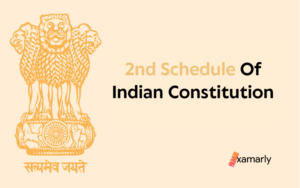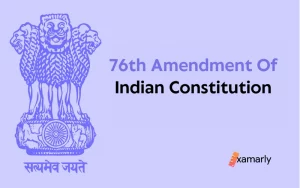The UPSC Civil Services exam opens doors to more stimulating vocations such as the Indian Administrative Service, Foreign Service, Indian Revenue Service, or the Police Service. This prestigious and competitive exam is attempted by thousands of candidates every year. To be successful in the exam you need to prepare well.
This post will provide you with a glimpse into a wealth of useful knowledge that is essential to comprehend before beginning IAS preparation.
To enrich yourself with more information about UPSC Exam, read it further. From “What is UPSC Exam?”, to UPSC Eligibility criteria, from knitting the strategy of UPSC Exam Preparation to the standard books needed, UPSC Exam Pattern and much more are covered in the article “All About UPSC Exam.
- What is Union Public Service Commission?
- List of Exams held by the UPSC
- What is UPSC Civil Services Exam?
- UPSC CSE Eligibility Conditions
- UPSC Civil Services Exam Pattern
- UPSC Prelims Syllabus
- UPSC Exam Optional Subjects List (Mains)
- UPSC Civil Services Exam Preparation Strategy
- Can I clear the UPSC Civil Service Exam by Self-Study?
- Which Books Are Suggested For The UPSC Exams?
- Should I take Online Mock Tests for the IAS Exam?
- Importance of the Right Strategy in Exam Preparation
- What is Examarly's Approach to Success in IAS/IPS Exams?
- Conclusion
- FAQs – All About UPSC Exam
What is Union Public Service Commission?
The Union Public Services Commission, or UPSC, is the premier central recruitment agency for Group ‘A’ officers in the Government of India. Its mission is to recruit qualified individuals for Government services.
This recruitment agency is known for its competitive examination and strict selection process. There are three phases to the UPSC examination, each requiring different levels of expertise and preparation.
The Constitution requires the commission to make appointments to the Union and All India Services. The Government must also confer with it on issues involving hiring, transferring, promoting, and disciplining employees. The commission can make suggestions to the government via the President, to whom it reports to directly.
However, the Government is not obligated by such advice. Along with the nation’s higher judiciary and, more recently, the Election Commission, the UPSC, which is a constitutional body, is one of the few institutions that operates with both autonomy and freedom.
Besides the Chairman, there are six other members of the commission. Members of the commission are appointed by the President of India.
In the event that the position of Chairman becomes vacant, one of the other Commission members may be appointed by the President to fill the position.
Moreover, roughly half of the Commission’s members must have served in government offices for a minimum of ten years, either for the Government of India or a State, at the time of their respective appointments.
A member of UPSC has a six-year tenure in office, beginning on the day they take office, or until they turn 65, whichever comes first.
This organization is a vital component of central governance, so it’s vital to understand it well.
List of Exams held by the UPSC
| 1. Civil Services Examination (CSE) | 6. Indian Statistical Service |
| 2. Indian Economic Service | 7. Combined Medical Services (CMS). |
| 3. Combined Geo-Scientist and Geologist Examination | 8. Indian Forestry Services Examination |
| 4. Engineering Services Examination (ESE) | 9. Special Class Railway Apprentices Exam |
| 5. Central Armed Police Forces Examination (CAPF) | 10. Limited Departmental Competitive Examination for selection of Assistant Commandant |
What is UPSC Civil Services Exam?
To hire individuals for the higher civil services of the Indian government, the UPSC administers the CSE on a national level. The Indian Foreign Service, Indian Police Service, and Indian Administrative Service are all covered in this. The selection of the ideal and most competent applicants for each service is the focus of the Civil Services Examination.
The UPSC Civil Services Examination (CSE) syllabus is very extensive and tests candidates’ aptitude, reasoning, and reading comprehension. The exam also tests the candidates’ knowledge of various disciplines and issues.
The UPSC Civil Services Examination comprises two parts: the preliminary and the main examination.
- The Preliminary examination requires candidates to cover a broad syllabus while the Mains examination is focused on a more specific set of subjects.
- The Mains Examination has nine papers and involves a series of tests that test the candidates’ learning and constancy. The examination is timed, so it is important to plan your preparation well to be a successful candidate.
Applicants eligible for the UPSC Civil Services Examination must fulfill the following criteria: age, educational qualification, and nationality. Candidates should have a graduation degree from a recognized university and must be between the ages of twenty and thirty-two. However, there are age relaxations for physically handicapped and SC/ST candidates.
UPSC CSE Eligibility Conditions
Nationality
- Applicants must be Indian inhabitants to be accepted into the IAS, IPS, and IFS.
- A candidate for other services must be one of the following:
- an Indian resident, or
- A native of Bhutan, or
- A native of Nepal, or
- a Tibetan refugee who entered India before January 1, 1962, to dwell there permanently; or
- a person of Indian ancestry who moved to India to stay there permanently from nations including Pakistan, Burma, Sri Lanka, Kenya, Uganda, the United Republic of Tanzania, Zambia, Malawi, Zaire, Ethiopia, and Vietnam.
Age Limit for UPSC
- To be eligible, an applicant must be at least 21 years old and not more than 32 years old.
- The upper threshold of age set forth above may be relaxed in the following circumstances:
- subject to a maximum of 5 years if an applicant is a member of a Scheduled Caste or a Scheduled Tribe;
- with a maximum of 3 years for individuals from Other Backward Classes who are qualified to take advantage of the applicable reservation;
- The upper age limit outlined above may be relaxed in the following circumstances: (c) for a maximum of 3 years in the circumstance of Defense Services Members injured during operations while engaged in conflicts with any foreign nation or a troubled area and discharged as a result;
- with a maximum of 5 years in the context of ex-servicemen, namely Commissioned Officers and Emergency Commissioned Officers (ECOs)/Short Service Commissioned Officers (SSCOs), who have completed a minimum of five years of Military Service
- subject to a maximum of ten years for aspirants who fall under the Persons with Benchmark Disabilities (PwBD) categories by medical examination, which include:
- Low vision or blind candidate;
- Hard of hearing or deaf;
- locomotor disability, which comprises cerebral palsy, leprosy cured, dwarfism, acid attack victims, and muscular dystrophy;
- autism, intellectual disability, specific learning disability, and mental illness;
- numerous disabilities including deaf-blindness.
Minimum Educational Qualification
A candidate must possess an equivalent degree or a graduate degree from one of the universities in India that have been:
- founded by an act of the Central or state legislature,
- or from any other institution of higher learning that an act of parliament has authorized,
- or that has been proclaimed to be treated as a university under Section 3 of the University Grants Commission Act, 1956.
Number of Attempts
Each applicant who shows up for the exam and proves to be qualified is given six chances to take the CSE. Additionally, the SC/ST/OBC and PwBD category candidates who are otherwise qualified will be given relaxation on the number of tries.
According to the relaxation, such applicants may make the following number of attempts:
| Category | Number Of Attempts |
| OBC | 9 |
| SC/ST | Unlimited |
| PwBD | For GL/EWS/OBC: 9 attempts For SC/ST: Unlimited |
Read ahead to learn more about How Many Attempts For UPSC? by visiting the linked page. This will give you more insight into age limits, number of attempts, and education qualifications required.
UPSC Civil Services Exam Pattern
The Union Public Service Commission establishes the UPSC Exam pattern, which also administers the Civil Services Exam annually through the application procedure. Since 2013, there has been no change to the UPSC Exam’s format.
The previous stage of the UPSC must be passed to move on to the next phase of the civil service exam.
The exam pattern of UPSC prelims and mains, and the Personality test/ interview text are all provided below. By studying these examination patterns, you can grasp the IAS paper format.
IAS Prelims Exam Pattern
| Paper | Type Of The Paper | No. Of Questions | Max. Marks | Time Duration | Negative Marking | Scope |
| GS Paper I | Objective | 100 | 200 | 2 hours | Yes | Marks are considered for cut-off |
| GS Paper II (CSAT) | Objective | 80 | 200 | 2 hours | Yes | Qualifying |
IAS Mains UPSC Exam Pattern
The UPSC Mains Exam comprises nine papers, out of which Paper-A and Paper-B are qualifying in nature. Paper-A and Paper-B are the Indian Language paper and the English paper respectively. The Mains Exam has 1750 total marks. To qualify, you must get at least 25% in both Paper-A and Paper-B. Marks in Paper-I to Paper-VII will be counted for merit rankings.
Below is a table listing all papers for the UPSC CSE Mains exam.
| Paper | Subject | Max. Marks | Duration | Scope |
| Paper A | Compulsory Indian Language | 300 | 3 hours | Qualifying |
| Paper B | English Language | 300 | 3 hours | Qualifying |
| Paper I | Essay | 250 | 3 hours | Merit |
| Paper II | General Studies I | 250 | 3 hours | Merit |
| Paper III | General Studies II | 250 | 3 hours | Merit |
| Paper IV | General Studies III | 250 | 3 hours | Merit |
| Paper V | General Studies IV | 250 | 3 hours | Merit |
| Paper VI | Optional I | 250 | 3 hours | Merit |
| Paper VII | Optional II | 250 | 3 hours | Merit |
Note:
- The applicant shall choose one Indian language from among those listed in the Constitution’s Eighth Schedule.
- Essays, General Studies, and Optional Subject papers will be evaluated simultaneously with all candidates’ qualifying papers in “Indian Languages” and “English,” however only those candidates will have their Essays, General Studies, and Optional Subject papers taken into consideration if they meet the minimum qualifying standards of 25% in “Indian Language” and 25% in “English.”
- For applicants from the States of Arunachal Pradesh, Manipur, Meghalaya, Mizoram, Nagaland, and Sikkim, paper A on the Indian Language will not be necessary.
UPSC Interview
The final tier of UPSC is Personality Tests to decide the eligible candidates. A Panel that will have a database of the candidate’s career in front of them will interview the nominee. Questions about topics of general interest will be put to the candidate.
All shortlisted candidates are interviewed by the UPSC board during the interview stage to determine whether they are qualified to hold a position in the civil service or one that is related to it.
The board will consider traits like critical thinking, analytical proficiency, mental sharpness, aptitude for leadership, capability for risk assessment, the capacity to balance judgment, analytical ability, intellectual and ethical integrity, etc.
This tier holds the maximum mark of 275 which means this phase is also important where your personality is put to test.
The UPSC will arrange for the interpreters, thus candidates are free to give interviews in the language of their choice.
Check out the linked article to discover more about UPSC Exam Pattern.
UPSC Prelims Syllabus
GS Paper I
The topics enlisted below are covered under the IAS Syllabus of GS Paper I:
- Current events of national and international importance.
- History of India and Indian National Movement.
- Indian and World Geography-Physical, Social, Economic Geography of India and the World.
- Indian Polity and Governance-Constitution, Political System, Panchayati Raj, Public Policy, Rights Issues, etc.
- Economic and Social Development-Sustainable Development, Poverty, Inclusion, Demographics, Social Sector Initiatives, etc.
- General issues on Environmental ecology, Bio-diversity, and Climate Change – that do not require subject specialization.
- General Science
GS Paper II (CSAT)
The CSAT is also known as the Civil Services Aptitude Test. This paper evaluates a candidate’s understanding, interpersonal communication, logic, decision-making, problem-solving, decision-making ability, basic arithmetic, data interpretation, and mental ability.
The CSAT syllabus UPSC civil service exam covers the following topics:
- Comprehension;
- Interpersonal skills including communication skills;
- Logical reasoning and analytical ability;
- Decision-making and problem-solving;
- General mental ability;
- Basic numeracy (numbers and their relations, orders of magnitude, etc.) (Class X level), Data interpretation (charts, graphs, tables, data sufficiency, etc. — Class X level);
Check out the linked article, to learn about How to Prepare For CSAT UPSC.
UPSC Exam Optional Subjects List (Mains)
The optional subjects are particularly significant for the UPSC CSE Exam because they account for 500 of the exam’s total 1750 points. The IAS Exam offers around 45 alternative subjects, many of which are in the literature category. A list of the probable optional subjects available for the UPSC Exam is attached below.
| Agriculture | Animal Husbandry and Veterinary Science | Anthropology | Botany | Chemistry |
| Civil Engineering | Commerce and Accountancy | Economics | Electrical Engineering | Geography |
| Geology | History | Law | Management | Mathematics |
| Mechanical Engineering | Medical Science | Philosophy | Physics | Political Science and International Relations |
| Psychology | Public Administration | Sociology | Statistics | Zoology |
Additional optional subjects offered by the UPSC for the UPSC Mains test include literature in the following languages, from which you can select the one that best suits your interests:
| Assamese | Bengali | Bodo | Dogri | Gujarati |
| Hindi | Kannada | Kashmiri | Konkani | Maithali |
| Malayalam | Manipuri | Marathi | Nepali | Odia |
| Punjabi | Sanskrit | Santhali | Sindhi | Tamil |
| Telugu | Urdu | English |
Explore the linked article on Best Optional Subject For UPSC. This will help you to find out the best optional subject among the list of subjects tabulated above. Hence ease your UPSC CSE preparation.
UPSC Civil Services Exam Preparation Strategy
One of the most challenging exams in India is IAS Examination. The IAS Exam is challenging because of the broad UPSC syllabus and fierce competition. However, you can pass the UPSC test on your first try if you follow a disciplined preparation plan and receive the appropriate mentoring. How to prepare for the UPSC Exam has been laid out below:
- Know the UPSC CSE syllabus and the paper format of UPSC. This will help you a lot in chalking out your strategy or schedule. Hence will keep you in check while preparing for IAS civil service exam.
- Examine the papers from prior years to have a good idea of the kinds of questions that will be posed during the exam.
- You should create a schedule. UPSC preparation is a time-consuming endeavor, so you’ll need a plan that lets you monitor your progress and avoid wasting your valuable time.
- Ensure your groundwork is firm: Start your preparation with the basic yet important NCERT books. This will enable you to build the framework of your study strong. Visit the linked article to learn more about how to prepare from NCERT books.
- Read standard books to expand your knowledge. Read the essay on the link for a comprehensive book list for UPSC preparation.
- UPSC Civil Services Exam preparation requires time management. You must review the concepts and complete brain exercises every day, even though it may not work last minute.
- A concentrated revision of whatever fresh stuff you acquired throughout the week should take up your whole weekend.
- Focus on working on your answer writing once you have finished more than half of the curriculum from the required books.
- It is also essential to track your errors as you prepare. It will be obvious that you won’t stick to your program if you aren’t organized. You’ll soon feel overwhelmed.
- Gauge your performance after taking an authentic exam-style mock test.
- These mock tests will let you know about your weak topics which you can revise to turn into your strength.
The UPSC CSE is an important test that tests you on your current affairs knowledge. Hence, you should make it a point to read the newspaper every day. Moreover, you can also use online sources for authentic news and information.
Current affairs are a major component of the Civil Service Mains Exam. You should also keep track of recent events and make notes of them. It is also helpful to read previous years’ question papers to understand how current affairs are posed.
Visit the linked articles tabulated below to know in detail about the UPSC preparation strategy.
Can I clear the UPSC Civil Service Exam by Self-Study?
Self-study is often advantageous for students who don’t feel comfortable to enrolled in a coaching class. However, it can take up a large amount of time. Students can choose the method that works best for them – self-study or coaching. Whether you learn best in a classroom or the privacy of your home depends on your personality.
Self-study can be challenging when concepts are difficult or require expert teaching. In addition, you can’t rely solely on self-study when the examination date is approaching! Self-study also requires a lot of reading material, expert knowledge, and willpower. Self-study is a good option if you can devote some time each day for the purpose.
Another difference between coaching and self-study is cost. The former is more affordable and convenient. It’s also more efficient and results-oriented. Self-study is a great option for students of all ages and can be accomplished on a budget.
Read the linked page to find out How To Prepare For UPSC Exams Without Coaching?
Which Books Are Suggested For The UPSC Exams?
You can also consider about 15 standard reference books for UPSC preparation, besides NCERT books for Class 6 to 12..
Following are some of the recommended books that one should read to give an edge to his/her UPSC Preparation:
- Indian Polity – by M. Laxmikanth
- Important Judgments that Transformed India – by Alex Andrews George
- Indian Economy – by Nitin Singhania
- Science and Technology – by Ravi P. Agrahari
- Indian Art and Culture – by Nitin Singhania
- Geography of India – by Majid Husain
- Modern Indian History – by Sonali Bansal and Snehil Tripathi
- Certificate Physical And Human Geography – by Goh Cheng Leong
- Oxford Student Atlas for India
- Lexicon for Ethics, Integrity, and Aptitude – by Niraj Kumar
- Important Acts that Transformed India – by Alex Andrews George
- Indian Economy – by Ramesh Singh
- Environment and Ecology – by Vaishali Anand
- Ancient and Medieval India – by Poonam Dalal Dahiya
- International Relations – by Pavneet Singh
Relatable Link
| Booklist For UPSC By Toppers | Best Online Platform For UPSC Preparation |
| Best Current Affairs Magazine For UPSC | Anthropology Books For UPSC |
Should I take Online Mock Tests for the IAS Exam?
As an aspirant, it is absolutely normal to have a lot of questions during your preparation. Are you about to take online mock tests? But before you do so, it is important to prepare well. A thorough study schedule is crucial for successful preparation.
The program should include a certain amount of time each day to review different resources, such as books, newspapers, and current affairs quizzes. Then, you should use online tools to take notes while revising. Regular revision improves your memory.
Online mock tests can help you assess your weaknesses and learn the pattern of the exam. In addition to that, they will give you a good feel for the style and format of the exam. A good practice series will consist of multiple mock tests, letting you solve them as many times as you like to practice.
The time allotted for the test, negative marking, etc is a crucial aspect of IAS preparation. It is vital to choose the right mock test series to help you prepare well for the exam.
The number of candidates taking the exam is highly competitive, so taking a quality mock test series is a good way to get a better score. Mock tests that cover different subjects and sections will give you valuable information about the level of competition in your region. The more mock tests you take, the more confident you’ll become.
Check out the linked article to discover How Many Mock Tests Before UPSC Prelims one should attempt.
Importance of the Right Strategy in Exam Preparation
Using the right strategy when preparing for an exam is essential for scoring well. You need to spend adequate time analyzing your notes and outlines to ensure you know all the material that you will encounter on the exam.
It’s also important to pay special attention to items that your instructor has emphasized during the class. Identify key points and write them down on index cards for later reference.
Using the right strategy will help you to maximize your productivity and avoid procrastination. Moreover, by starting the preparation process early, you will feel more confident and less stressed on the day of the test. Time management will improve your productivity by a lot, so it’s crucial to develop a schedule.
Exams are divided into two parts: multiple-choice questions and essay questions. The multiple-choice questions test your knowledge of vocabulary and reading comprehension.
The questions in the essay section measure your ability to think, analyze, and interpret information. It’s important to analyze the essay questions carefully and underline keywords so that you can remember them later on.
Exam preparation is a key component, so it’s crucial to have the right strategy for your particular situation.
What is Examarly’s Approach to Success in IAS/IPS Exams?
Candidates for the UPSC IAS can discover all they need at Examarly, from study guides to the best methods of preparation. Examarly’s strategy for your success is straightforward. It first assesses your expertise and familiarity with the subject.
This will give it the ability to customize a plan that best suits your requirements or demands, ensuring that you never fall behind in exam preparation. The entire process is in the works; this is just a starter. You will discover more study tools as you go along that will keep your exam preparation at a high level.
Some of its plus points are mentioned below:
- Here you will discover the best-suited curated content for UPSC Preparation. Curated content makes your preparation smoother than before. Additionally, it will halt you from wasting time searching for the best study materials.
- Perfectionism is a process that requires practice. To be perfect, attempt the micro test regularly at Examarly. This will help you to enhance your existing knowledge and hence takes you one step closer to your dream.
- The stats section will give you a vivid picture of your overall preparation. Thus this section enables you to track your UPSC Preparation.
- You have the right to seek out information or guidance, as well as to lend a hand. In short, you can clear doubts for uninterrupted preparation.
- Every successful exam preparation method must include revision. Here you will also get revision schedules as per your need.
Conclusion
The UPSC Civil Service Exam (CSE) is one of the toughest exams, and it demands a lot of hard work on your part. It is essential to stay motivated and consistent throughout the preparation process.
Having a proper study plan while taking up UPSC Civil Service Exam is always recommended. This will allow you to allocate time and avoid distractions. Self-study involves the use of your mind to learn and apply information. It is also important to follow a strict schedule. You need to ensure that you complete your preparation in the allotted time.
FAQs – All About UPSC Exam
Where can I obtain the most recent notifications from the Union Public Service Commission?
On the official UPSC website, one can locate recent notifications.
How much advance preparation is needed before the Prelims?
The answer to the question “How much preparation is required before the Prelims?” depends on the individual’s preparation level. Some students spend three months studying for the examination. Others prepare for two months or less. The amount of time required depends on the student’s pace of study, the ability to memorize facts and figures, and the subject he/she is studying.
When and why did UPSC implement CSAT?
CSAT was first implemented in 2011 as a component of the UPSC CSE to evaluate a candidate’s aptitude, analytical skills, and reasoning power.
Are UPSC CSE and IAS exams the same thing?
Yes, both are the same thing. IAS is more popular than all the other Civil Services so one can join after cracking the UPSC CSE exam. UPSC Exam is commonly referred to as the IAS exam.
Is there a negative marking in the UPSC CSE?
As the UPSC CSE Mains Exam is a subjective and descriptive paper, there is no negative marking in the Mains Exam. However, the UPSC CSE Prelims does have a negative marking system. For every wrong answer, there will be a deduction of 1/3rd of the marks allotted to that question.






